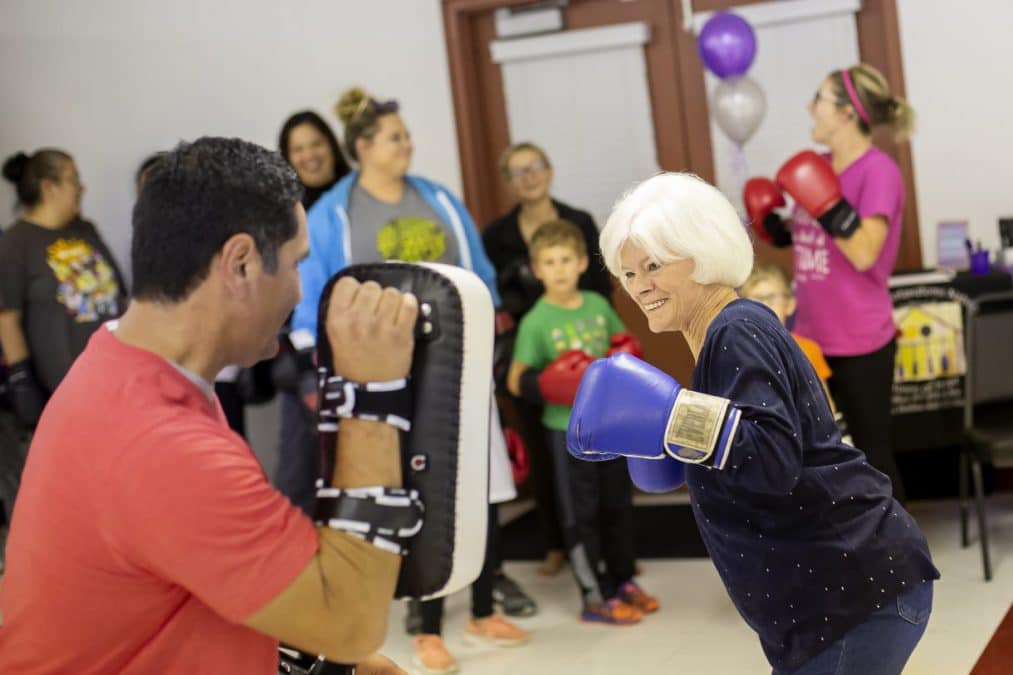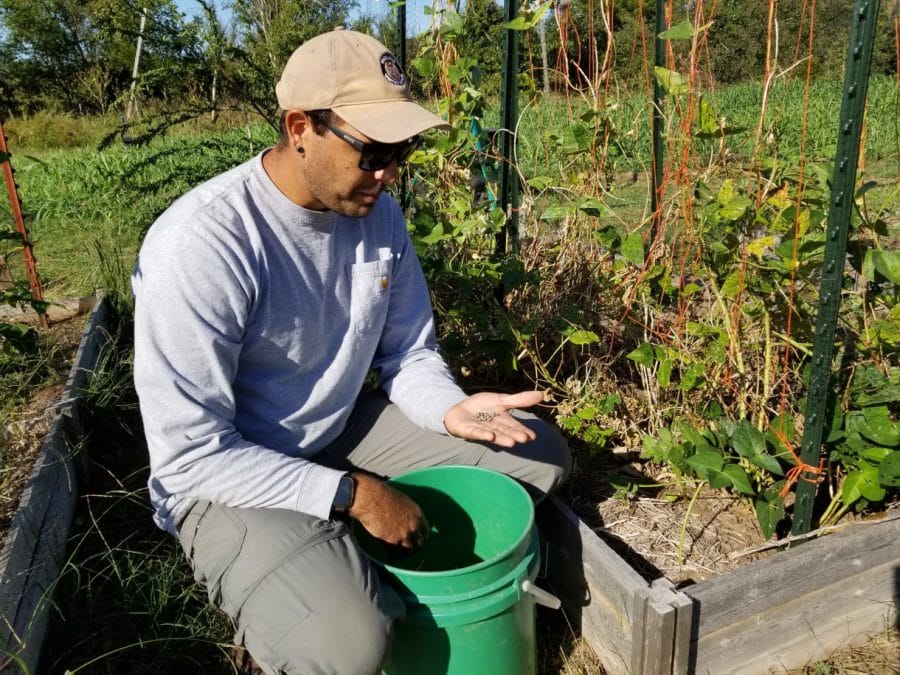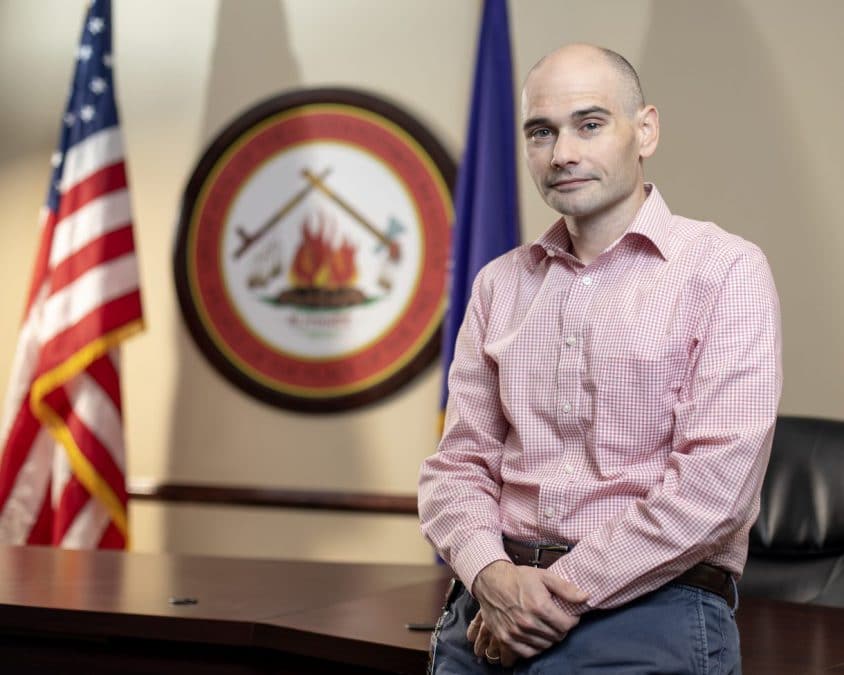During this episode, we’ll hear about services House of Hope offers to domestic violence victims, take a look at what’s growing in the community garden and get a history lesson about Tribal self-governance. CPN’s Language Department Director also teaches a social powwow dance song during this month’s “Learning Language.”
Domestic Violence Awareness Month
92 percent of women killed by men in 2017 were killed by someone they knew, according to a study released by the Violence Policy Center. The most recent report released in September 2019 analyzes data from 2017. Native American women experience domestic violence at a higher rate than any other race. Citizen Potawatomi Nation’s House of Hope offers resources and shelter to any individual experiencing domestic violence, stalking, sexual abuse or intimate partner violence. October is Domestic Violence Awareness Month, and House of Hope’s advocate Kayla Woody offered her thoughts and experience working with victims.

“Being with House of Hope, I get to help someone escape something that has been held over them someone for so long. And to get to see the smile on their face when they have just a moment of peace, it’s an absolutely wonderful experience,” Woody said.
House of Hope is on the web at cpnhouseofhope.com and on Facebook at Citizen Potawatomi Nation House of Hope. They can also be reached by phone at 405-275-3176, and their 24/7 crisis line is 405-878-4673. The National Domestic Violence Hotline is 800-799-7233.
Fall Harvesting in the CPN Community Garden
The Bodewadmi Widoktadwen Gtegan (Potawatomi Community Garden) near the CPN Cultural Heritage Center boasts bountiful harvests each season. The plants that claim fall as their natural harvesting period have helped Potawatomi live through the cold winter months for a millennium, rounding out a healthy diet and acting as natural medicines.

“Three Sisters is an ingenious system. It is a complete system in and of itself and one that I think incorporates a lot of values of indigenous societies. And just in the way that it’s efficient but not overly efficient and it’s all about balance,” DeerInWater said. “And you’re balancing your nutrition you’re balancing your plant structures your ecology the environment the soil and all that. Everything is integrated together.”
Please research before growing, collecting, cooking or using these items, and be aware of pesticide usage. For more information about the Community Garden, join the Facebook group, Gtegemen: CPN Community Garden, or email chcgarden@potawatomi.org.
Learning Language
It’s time for Learning Language, when CPN Language Department Director Justin Neely teaches song, phrases, stories and more. During this episode, he covers a social powwow dance song.
Mamwe gda mishkosmen.
(Mom-way guh-dah meesh-kosmen)
Altogether we are strong.
Noek shkode gi bodwewat.
(No-ak sko-day gee bod-way-wat)
We have lit the seventh fire.
Abdek neshnabemyak.
(Aub-duk nesh-nah-bem-yak)
We have to speak our language,
Mnopmadzeyak.
(Min-nope-madze-yak)
So we can live a good life,
Mnobmadzeyak.
(Min-nope-madze-yak)
So we can live a good life.
For more information and opportunities with language, including self-paced classes, visit cpn.news/language. You can find an online dictionary at potawatomidictonary.com as well as videos on YouTube. There are also Potawatomi courses on the language learning app Memrise.
A history of self-governance
Oklahoma recognized Indigenous Peoples’ Day in October for the first time this year. Following centuries of hardships through colonialism and treaty agreements with the United States, Native American tribes have strengthened their rights as sovereign nations in the last 50 years — particularly the right to govern themselves. Citizen Potawatomi Nation Self-Governance Grants Analyst Jeremy Arnette explains some of the history of tribal self-governance and its effect on services.

“Prior to treaty making, tribes had their own government structure, their own ways, and they went about their lives as a tribes in the way that they saw fit. So they were executing sovereignty that way, and the treaty sort of put a fence around that and then continued to shrink it,” said Arnette.
For more information, read an edition of the American Indian Law Review regarding the Indian Self-Determination and Education Assistance Act at cpn.news/selfgov, or visit the Self-Governance Communication and Education Tribal Consortium at tribalselfgov.org.
Hownikan Podcast is produced and distributed by Citizen Potawatomi Nation’s Public Information Department. Subscribe to Hownikan Podcast on Apple Podcasts, Spotify, SoundCloud and wherever you find your favorite shows. Find digital editions of the Tribal newspaper here.
